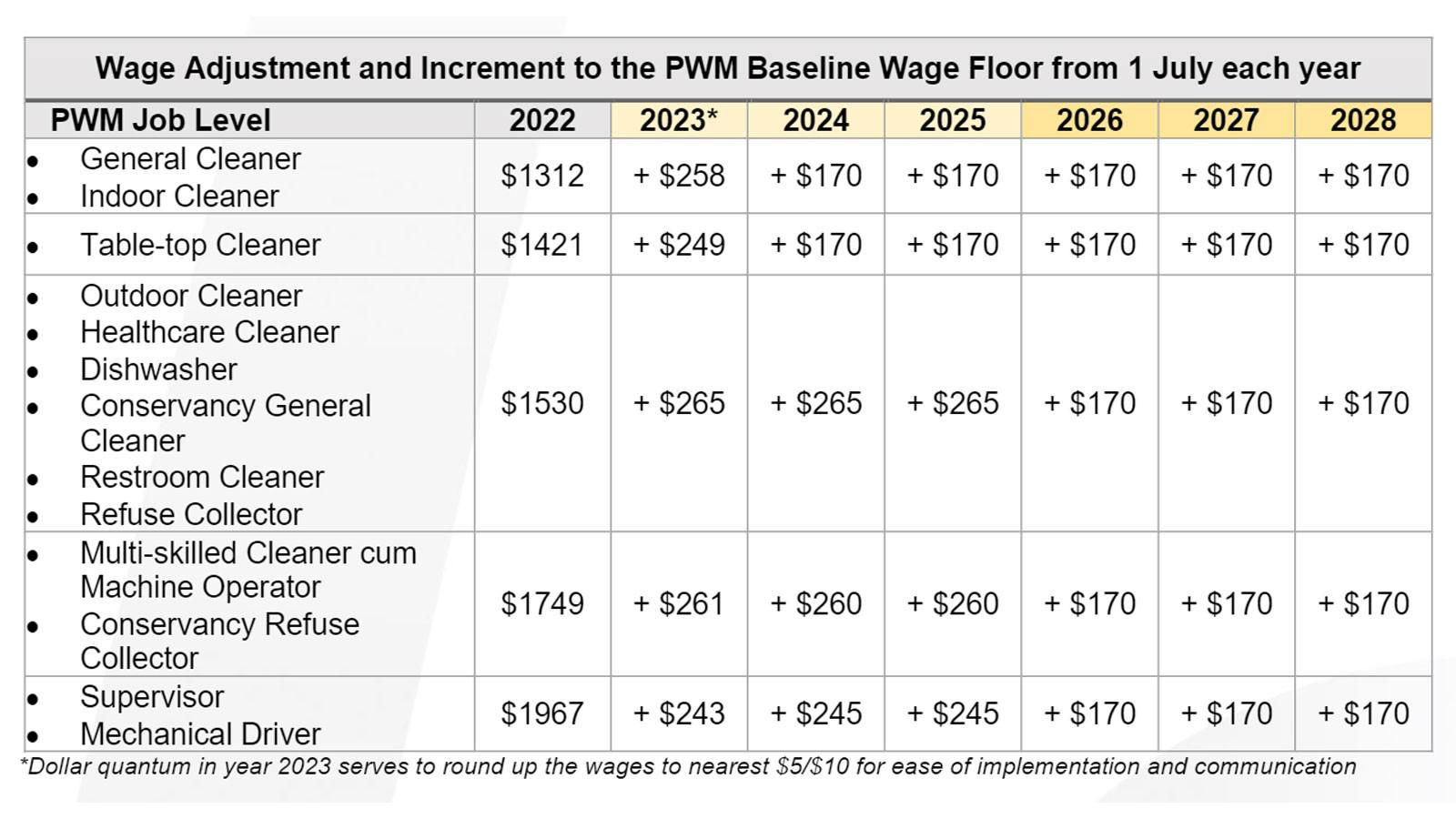share on
One of the recommendations sees employers increasing a general cleaner’s wage from a base salary of S$1,312 in 2022 to S$1,570 by 2023, and to S$2,420 by 2028.
On Monday (7 June), Singapore’s Tripartite Cluster for Cleaners (TCC), through a media-only virtual event attended by HRO, announced its latest review of the Progressive Wage Model (PWM) for the cleaning industry. This move is to recognise the importance and higher value of work shouldered by the cleaners, particularly during the COVID-19 pandemic.
TCC presented three recommendations—revolving around a mandated wage increase and enhanced training requirement for cleaners—which were approved by the government.
These recommendations will affect not only the cleaners, but also service providers as well as service buyers. Currently, Singapore is estimated to have about 1,500 cleaning companies, and a total workforce of about 56,000 (of which 40,000 are estimated to be residents), per data shared by National Trades Union Congress (NTUC).
The following are TCC’s approved recommendations:
- Training requirements - All cleaning businesses are to ensure that all its resident cleaners are to attain one mandatory module on workplace safety & health (WSH), and another workforce skills qualification (WSQ) module to be selected from a list of approved core modules by 31 December 2022.
- Upskilling requirements - Beyond 2025, the total number of WSQ training modules cleaners must be trained in, will be increased to three for those in lower job rungs, and four modules for those in higher job rungs. These are inclusive of the mandatory WSH module.
- Progressive wage requirements – From 1 July 2023 to 30 June 2029, through a six-year schedule, base wages of cleaners across all job levels will see a year-on-year increase. The first aggressive adjustment will take place in 2023, before seeing a consistent adjustment in the next few years.
The wage adjustments are depicted in the diagram below:

(Image: TCC)
With regard to the topic on wage increment, Tony Chooi, President of Environmental Management Association of Singapore (EMAS), part of the TCC, responded to a media question on whether the updated PWM will cause service providers to bear the burden of labour costs, and how employers should approach the subject.
For the unacquainted, previous PWM updates about wages in 2016 and 2018, cleaners were slated to receive:
- A specified dollar quantum increment from 1 July 2017 to 30 June 2019;
- An annual increment of 3% to the PWM baseline wages for all job roles from 1 July 2020 to 30 June 2023; and
- A mandatory two-week PWM bonus to all eligible resident cleaners from January 2020 onwards.
To this, Chooi replied: “The salary increment will, of course, increase the cost burden on cleaning companies. This is why we're asking for a two-year runway to 2023, before these salaries kick in.
“So that,” he continued, “we have time to price our future tenders correctly. And if the contracts are long-term, stretching beyond 2023, we then have time to negotiate with service buyers to see how we can reach a mutually-agreeable solution to front the salary increase.”
Thus, he reiterated that this six-year schedule will “allow greater certainty and transparency during bidding and awarding of contracts” between service providers and service buyers.
As providers, employers can then, for instance, make use of lead time to better determine contract pricing when bidding for new contracts. And buyers, on the other hand, can use it to plan their budget, and move towards outcome-based contracts, instead of conventional headcount contracts, to optimise the deployment of manpower.
The TCC, in the media briefing, also noted on the potential impacts of wage adjustments to both buyers and providers, and chimed in.
Phyllis Lim, Deputy Director of NTUC's U Care Centre, which supports low-wage workers, shared how the team had called upon the Government to consider providing two forms of assistance to help the industry cope with the spike in labour costs:
- A transitional wage assistance;
- An adjustment to the Dependency Ratio Ceiling (DRC), a maximum permitted ratio of foreign workers to the total workforce a company in a stipulated sector is allowed to hire.
Zainal Sapari, NTUC Assistant Director-General and Chairman of the TCC, said, “The proposed PWM Wage Ladder comes after extensive consultations with industry stakeholders.”
“Despite the economic uncertainty and due to the nature of the cleaning business, we felt that it is important to provide a clear and transparent six-year schedule of increase as it provides greater certainty to service providers and service buyers to price and award the cleaning contracts that would be fair to all stakeholders, including our cleaners.”
Further, he urged essential service workers in the cleaning industry to continue to upskill themselves as the industry adopts more technology and jobs are redesigned.
The TCC will convene again in 2025 to review the wage schedule.
Image/Unsplash
Follow us on Telegram @humanresourcesonline or click here for all the latest weekly HR and manpower news from around the region!
share on
Follow us on Telegram and on Instagram @humanresourcesonline for all the latest HR and manpower news from around the region!
Related topics


